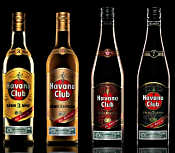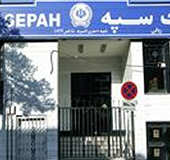 The apparently never-ending fight over the trademark for “Havana Club” rum made a detour through the Office of Foreign Assets Control and into the Federal District Courtroom of Judge Royce Lamberth. At issue was an OFAC decision that effectively denied the renewal of the registration of the “Havana Club” trademark in the United States.
The apparently never-ending fight over the trademark for “Havana Club” rum made a detour through the Office of Foreign Assets Control and into the Federal District Courtroom of Judge Royce Lamberth. At issue was an OFAC decision that effectively denied the renewal of the registration of the “Havana Club” trademark in the United States.
Judge Lamberth’s decision, released last Thursday, had something for everyone. For the Cuban side his order required that OFAC provide more documentation of why it appeared to have held that the general license for transactions in connection with Cuban trademark renewals wasn’t applicable. For the OFAC-Bacardi side, Judge Lamberth held that OFAC licensing decisions were immune from judicial review (which, no doubt, led to much rejoicing and merriment, perhaps even some dancing, in the halls of OFAC).
For those of you who haven’t followed the peregrinations of the struggle between Bacardi and Pernod-Ricard over the Havana Club rum trademark (and I assume that’s almost everyone), here is a short “Havana Club for Rummies.” Pernod-Ricard bases its claim to the trademark based on a transfer by Cubaexport of the trademark to Havana Club Holdings SA (“HCH), a joint-venture between the Cubans and Pernod-Ricard. Bacardi bases its claim to the trademark on a purchase of the rights to trademark from the exiled members of the Arechabala family. The Arechabalas had produced Havana Club in Cuba until their distilleries were seized by Castro in the 1960s.
Much litigation then ensued between Pernod-Ricard1 and Bacardi, with Pernod-Ricard filing a suit against Bacardi for trademark infringement and Bacardi filing an action before the Patent and Trademark Office (“PTO”) to cancel Pernod-Ricard’s registration of “Havana Club.” Pernod-Ricard lost its infringement claim and all the subsequent appeals. Bacardi lost its cancellation petition and its appeal of that decision is still pending.
In the meantime Pernod-Ricard needed to renew its registration for the Havana Club trademark. This posed certain difficulties because the trademark was held by HCH — a joint venture with the Cubans. That, of course, made it difficult for HCH to pay its U.S. lawyers and to pay to the PTO the registration fee for the trademark, both of which may be prohibited by the Cuban Assets Control Regulations.
I said “may” because it is not clear whether the general license contained in 31 C.F.R. § 515.527(a) applies or not. The general license permits transactions related to trademark registration applications or renewals by Cuban nationals. However, in 1998 Congress — after extensive lobbying by Bacardi and others — exempted from the general license any
mark, trade name, or commercial name that was used in connection with a business or assets that were confiscated, as that term is defined in § 515.336, unless the original owner of the mark, trade name, or commercial name, or the bona fide successor-in-interest has expressly consented.
Needless to say, Bacardi and Pernod-Ricard disagree over whether the Havana Club trademark meets the standards set forth in the exemption from the general license. Pernod-Ricard argues that the Arechabala family abandoned the trademark when it failed to renew its U.S. registration for that trademark in 1973 and that therefore this trademark doesn’t meet the exemption standards.
Just to be safe, Pernod-Ricard applied for a license from OFAC to engage in the transactions necessary to renew the Havana Club registration. OFAC sat on that letter for almost four months and then on the day after the Havana Club trademark registration had expired (just a coincidence, no doubt!) denied the license application to take the steps necessary to renew the registration. Pernod-Ricard sought review of that OFAC decision in federal district court, which brings us to Judge Lamberth’s decision.
The first important issue considered by Judge Lamberth was whether the OFAC decision denying the specific license to renew the trademark was a decision that the general license set forth in 31 C.F.R. § 515.527(a) wasn’t applicable. The court held that the record was insufficient to determine what OFAC had made any decision about the applicability of the general license. In order to make a determination on this point, the court ordered OFAC to provide information as to
whether it concluded [Pernod-Ricard] could not rely on the general license in 31 C.F.R. § 515.527(a)(1) , and if so, how and why it determined the exception in part (a)(2) embraced [Pernod-Ricard’s] HAVANA CLUB registration. Further, it should explain what process [Pernod-Ricard] was afforded with respect to this particular determination.
The second issue was the reviewability of OFAC’s decision to deny the application for a specific license. Judge Lamberth held that the granting of licenses under the Cuban sanctions program was committed solely to OFAC and, therefore, not subject to judicial review.
It is a fundamental tenet of judicial review that when a court reviews an action or decision, it must do so against some standard. [Pernod-Ricard] asks this Court to judge whether OFAC’s denial of a specific license was consistent with U.S. foreign policy and its own prior licensing decisions. Neither presents a justiciable standard of review.
Notwithstanding this refusal to review OFAC’s denial of a specific license, the game is far from over. Even though the Court felt it couldn’t review the denial of a license, it did feel there were sufficient criteria to permit it to review a determination by OFAC that the trademark was or wasn’t used in conjunction with seized Cuban property and, therefore, was or wasn’t eligible for the general license for trademark applications and renewals.
Several results, then, are possible. The court might find that OFAC made a determination that the Havana Club trademark wasn’t eligible for the general license but that such determination was wrong. Pernod-Ricard could then fairly safely re-register its trademark with the PTO. Or the court might find that OFAC did properly make such a determination, in which case Pernod-Ricard won’t be able to do anything at the PTO. Finally, the court might find that OFAC made no determination on the applicability of the general license. This means, I suppose, that Pernod-Ricard could try to claim the general license applied and file with the PTO. OFAC would, of course, issue a pre-penalty notice claiming that the general license didn’t apply, and everyone would be back where they started.
_______________
1 To avoid unnecessary confusion, I am referring to Cubaexport, HCH and Pernod-Ricard simply as Pernod-Ricard throughout the remainder of this post.


 Posted by
Posted by  Category:
Category: 

 There has been some discussion here at Export Law Blog about the proper role of freight forwarding companies in export enforcement. If a customer of a freight forwarder proffers a package addressed to Iran without an OFAC license, should the freight forwarder decline the package and tell the customer that shipments to Iran must be licensed? Or should the freight forwarder accept the package and call the authorities? The recent
There has been some discussion here at Export Law Blog about the proper role of freight forwarding companies in export enforcement. If a customer of a freight forwarder proffers a package addressed to Iran without an OFAC license, should the freight forwarder decline the package and tell the customer that shipments to Iran must be licensed? Or should the freight forwarder accept the package and call the authorities? The recent  The Office of Foreign Assets Control (“OFAC”) today
The Office of Foreign Assets Control (“OFAC”) today  The Office of Foreign Assets Control (“OFAC”) yesterday released its
The Office of Foreign Assets Control (“OFAC”) yesterday released its  The apparently never-ending fight over the trademark for
The apparently never-ending fight over the trademark for 

